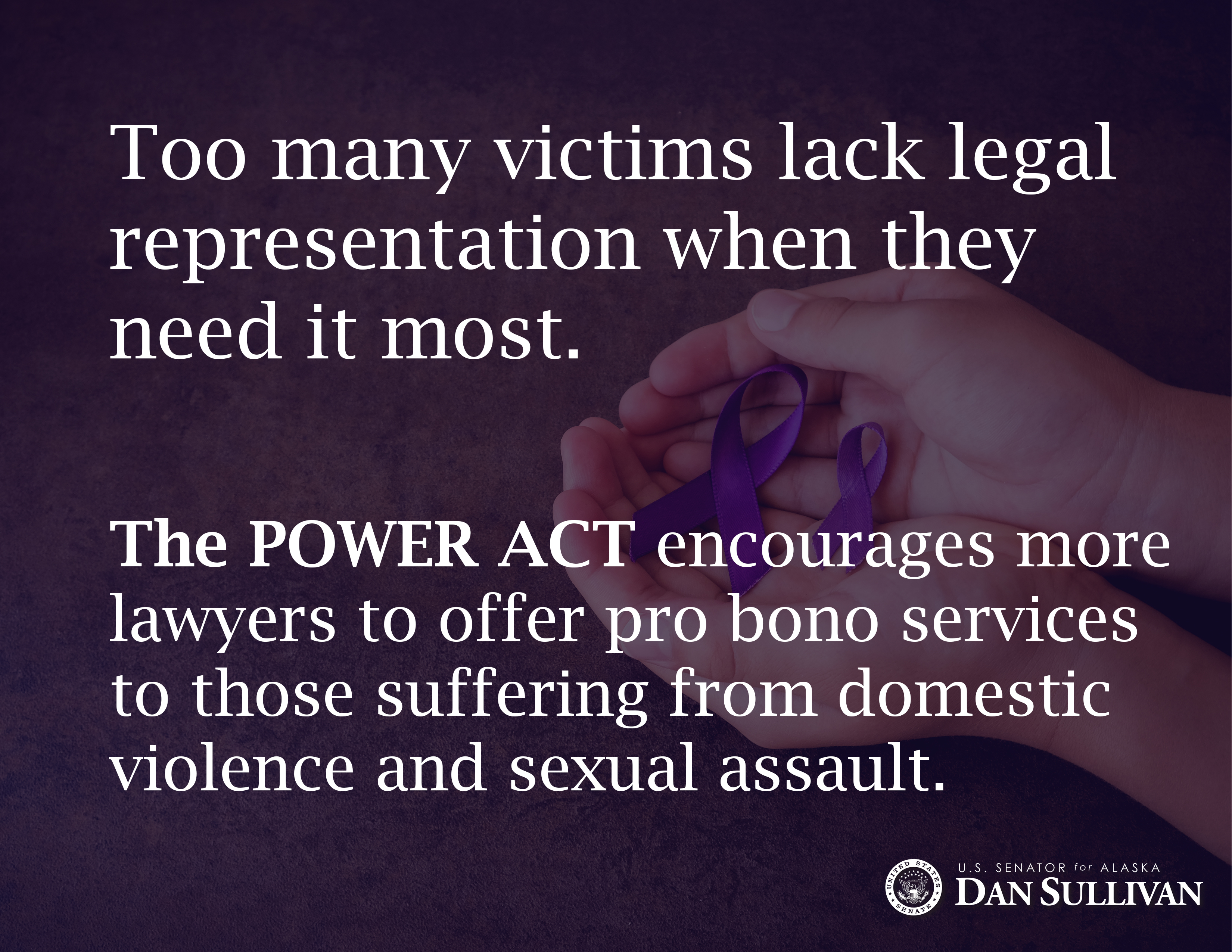Sullivan's Bipartisan POWER Act Passes Out of House
Legislation to Equip Domestic Violence Survivors with Legal Tools
WASHINGTON, DC – Today, U.S. Senator Dan Sullivan (R-AK) and Alaska Congressman Don Young praised the House-passage of S.717, the Pro Bono Work to Empower and Represent (POWER) Act. The POWER Act, as amended in the U.S. House, mandates that each year for four years, the Chief Judge of each Judicial District across the country hold at least one event promoting pro bono legal services as a critical way to empower survivors of domestic violence, stalking, and sexual assault, engage citizens, and help lift victims out of the cycle of violence. The bill also requires that every two years for four years, an event be held in areas with high numbers of Native Americans and Alaska Natives, with a focus on addressing these issues among Native populations. The bill now returns to the Senate for consideration.
“The statistics on victims of sexual assault and domestic violence in Alaska and across the country are horrific,” said Senator Sullivan, sponsor of S. 717. “Roughly 25 percent of American women will be victims of domestic assault in their lifetime. On average, every day in our country, three women are killed by a current or former partner. Combating this scourge has been one of my priorities in the Senate and the need for urgent action is now. My hope is that the bipartisan POWER Act will help create an army of lawyers to defend victims of abuse. I’m grateful for the support of Congressman Young, Rep. Joe Kennedy (D-MA), and a bipartisan coalition in the House and Senate that offered their support for this legislation. I look forward to its timely passage in the Senate.”
“Domestic violence is a tear in fabric of our society and no one is immune to it – unfortunately far too many Alaskans have first-hand experience with this reality,” said Congressman Young. “In a 2015 survey of Alaskan victims of domestic violence, out of every 100 women surveyed at least 40 experienced intimate partner violence and 33 women experienced sexual violence. Not only must we do more to prevent this devastating epidemic from growing, but we must also do more to help survivors of domestic violence. The POWER Act does just that. This bill is an important step for providing domestic violence victims with increased access to the pro bono legal tools available to help stem the tide of violence in our communities.” Watch Congressman Don Young’s floor remarks on S. 717 (click image or here to watch).

Background on the POWER Act
The National Network to End Domestic Violence estimated that over the course of one day in September 2014, up to 10,000 requests for services by abused women, including legal representation, weren’t met because of lack of resources.
Studies have shown that when abuse victims are represented by an attorney, their ability to break out of the cycle of violence increases dramatically. For example, one study found that 83 percent of victims represented by an attorney were able to obtain a protective order compared to just 32 percent of victims without an attorney.
The POWER Act is modeled after the pro bono summits Senator Sullivan organized throughout the state while he was Attorney General of Alaska working on the Choose Respect campaign.
The POWER Act was introduced in the Senate by Senator Sullivan and Senator Heidi Heitkamp (D-ND). Senators Shaheen (D-NH), Murkowski (R-AK), Capito (R-WV), Cornyn (R-TX) and Daines (R-MT) also were original co-sponsors of the bill. It passed the Senate unanimously in August 2017.
Congressman Young, alongside Joe Kennedy (D-MA), Congresswoman Tulsi Gabbard (D-HI), Congresswoman Susan Brooks (R-IN), and Congresswoman Cathy McMorris Rodgers (R-WA) introduced companion legislation in the House in March 2017.
In recent months, Senator Dan Sullivan worked with stakeholders to clarify language within S. 717 in order to ensure its timely passage in the House. The amended S. 717 now returns to the Senate, where it will once again require passage before heading to the President’s desk.
###
Next Article Previous Article
